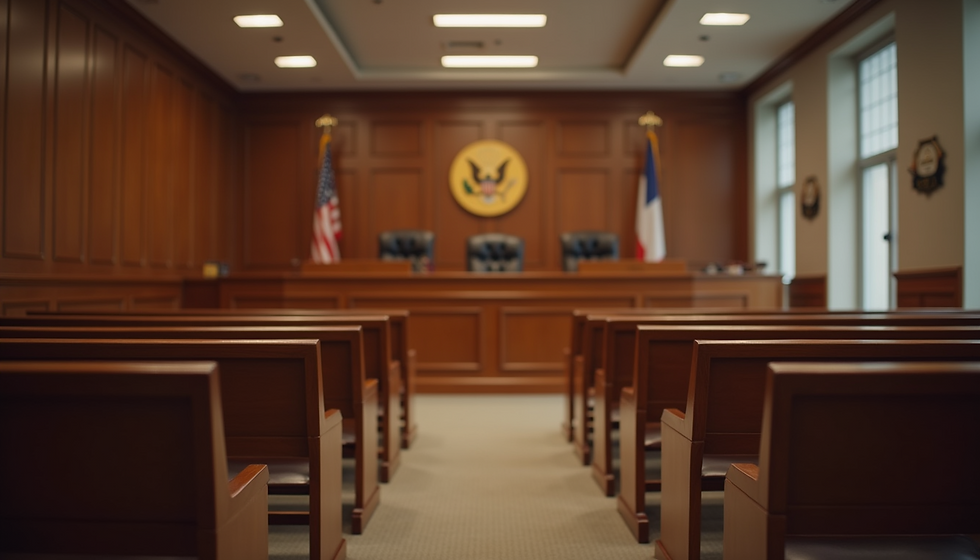Exoneration Insights from Ryan Kuehner a Former St Charles County Sheriff's Deputy
- ryankuehner
- Oct 23, 2025
- 4 min read
A Personal Look into Exoneration
Exoneration is a powerful word that signals justice and the reclaiming of a life after wrongful accusations. Ryan Kuehner, a former St. Charles County Sheriff's Deputy, provides valuable insights into this topic. Having seen the court system from both sides, Kuehner's perspective reveals the challenges faced by exonerated individuals and the systemic issues that can lead to wrongful convictions. In this post, we will explore Kuehner's experiences, the critical role of exoneration in the justice system, and practical steps that can improve procedures for those wrongfully accused.
The Journey to Exoneration
Exoneration is not merely about proving someone's innocence; it involves navigating a cumbersome legal landscape. Kuehner emphasizes that the journey often begins with a conviction that feels overwhelming. Many individuals wrongfully convicted face an uphill battle to clear their names.
The emotional toll of being wrongfully accused is severe. According to the National Registry of Exonerations, about 71% of exonerated individuals face serious mental health issues, such as PTSD or anxiety disorders, after their release. Families are often torn apart, and the stigma of a criminal record can persist even after exoneration. Kuehner highlights that the psychological impact of wrongful convictions is frequently overlooked yet is central to the exoneration journey.
His experience as a deputy provides insight into various factors contributing to wrongful convictions, including:
Inadequate Legal Representation: Many defendants cannot afford a qualified attorney, which significantly hampers their chances of a fair trial.
Prosecutorial Misconduct: Ambiguous evidence may be exaggerated or ignored, influencing case outcomes.
Unreliable Witness Testimony: Eyewitness misidentifications can play a significant role, with research showing that such testimonies contributed to over 70% of wrongful convictions.
These elements can create a perfect storm, leading to tragic consequences.
The Role of Law Enforcement
Kuehner, as a former sheriff's deputy, knows how important law enforcement's role is in the exoneration process. He asserts that officers must conduct thorough investigations and be mindful not to contribute to wrongful convictions. This involves:
Carefully examining evidence
Thoroughly questioning witnesses
Staying open to the possibility of mistakes
He also emphasizes the need for training programs for law enforcement officers to better understand the risk of wrongful convictions. Educating officers about their impact on individuals can foster accountability and transparency, which may help prevent wrongful convictions before they occur.

The Legal System's Challenges
Often viewed as a beacon of justice, the legal system has its flaws. One of the most significant hurdles in the exoneration process is the lengthy and complex appeals process. Kuehner points out that many wrongfully convicted individuals find themselves stuck in a slow-moving system that doesn't respond promptly to new evidence or claims of innocence.
For example, an exonerated individual may spend an average of 11 years imprisoned before their case is reviewed, according to the National Registry of Exonerations. This delay can feel insurmountable, especially for those lacking legal knowledge or resources. A staggering 80% of wrongfully convicted individuals cannot afford competent legal representation. This access disparity is a pressing issue that requires attention.
Moreover, public perception poses its challenges in the exoneration process. The stigma attached to a criminal conviction can linger, making it hard for exonerated individuals to reintegrate into society. This social isolation often complicates the already difficult journey of reclaiming one’s life after wrongful accusations.
The Importance of Advocacy
Advocacy is a vital component of the exoneration process. Kuehner insists that organizations and individuals must rally around those wrongfully convicted, offering support that can be essential for rebuilding their lives. This support can include legal assistance, emotional support, and public awareness campaigns targeting wrongful convictions.
Kuehner encourages individuals to engage in advocacy efforts, whether by volunteering with organizations focused on wrongful convictions or simply raising awareness about the issue. By illuminating the challenges that exonerated individuals face, we can pave the way for a more equitable and just legal system.

Moving Forward: Recommendations for Change
Kuehner outlines several actionable steps to enhance the exoneration process and reduce wrongful convictions:
Improve Legal Representation: All individuals must have access to strong legal counsel, which may require increasing funding for public defenders and resources for legal education.
Enhance Training for Law Enforcement: Training programs should help officers understand the potential for wrongful convictions and the importance of thorough investigations.
Streamline the Appeals Process: Making the appeals process more user-friendly and efficient will help individuals present new evidence or claims of innocence more easily.
Promote Public Awareness: Advocacy efforts should focus on raising awareness about wrongful convictions and the obstacles faced by individuals pursuing exoneration. Changing public perception can create a more supportive environment for the falsely accused.
Utilize Technology Responsibly: As technology advances, it is vital to implement rigorous standards to ensure reliable forensic methods and correctly interpret evidence.
Continuing the Fight for Justice
Ryan Kuehner’s insights shed light on the complexities and obstacles faced by individuals who are wrongfully convicted. His experiences as a former St. Charles County Sheriff's Deputy provide a windows into the systemic issues that contribute to these injustices.
Exoneration represents a journey toward reclaiming one’s life and pursuing justice. By acknowledging the challenges faced by the wrongfully accused and advocating for meaningful reforms within the legal system, we can help create a future where wrongful convictions are minimized, and justice is truly served.
As we reflect on Kuehner’s experiences, it is important to remember that the pursuit of justice is ongoing. Each person has a role in supporting those who have been wrongfully accused and advocating for a fairer legal system. Together, we can work towards making the path to exoneration clearer and more accessible for all.


